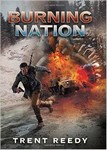Through the Looking Glass Children's Book Reviews
Burning Nation
Fiction Series
For ages 14 and up
Scholastic, 2015 ISBN: 978-0545548731
In the summer, just a few months ago, Danny was a carefree teenager who had his whole life ahead of him. He had a girlfriend he adored, a job he loved, he was a star in the high school football team, and he had completed his basic training in the Idaho National Guard. Then one day his world fell apart. There were hints that trouble was brewing for months before that pivotal day. Many people in the United States were suffering due to high rates of unemployment, and there was also discontent because many Americans did not approve of a new identity card that the federal government wanted its citizens to use. The card contained a tracking device and people felt that this was a violation of their privacy.
Members of the public were not the only ones who did not like the idea of the identity card. The governor of Idaho was also troubled by the implications such a card could have for his fellow Idahoans. There were demonstrations in Boise, the state capital, and as these escalated the National Guard was called in to help keep the peace. Danny was one of the young people who found himself facing angry and potentially violent demonstrators. By accident Danny fired his gun and the next thing he knew the President of the United States was demanding that the governor hand Danny, and other guardsman, over for prosecution. The governor refused.
So much has happened since that first terrible day. Federal soldiers have attacked Idaho, and now fighting is taking place all over the state. Try as they might, Danny and the other National Guardsmen, and the civilians who are helping them, cannot hold their positions and they are forced to retreat. Not surprisingly, the Federal government takes control of the northern part of the state, including the town where Daniel grew up. The Feds are looking for Daniel and his friends, but the young people are hiding in a small room under the floor of the garage where Daniel used to work.
For weeks the young fighters stay in hiding. One of their friends brings them news about what the Feds are doing in town, and they also listen to the news, though they know what they are hearing is heavily censored. The president has put something called the Unity Bill in place which allows her to do many things that violate the rights of citizens, including preventing the media from releasing anything that she thinks might be inflammatory.
Then the governor of Idaho announces Idaho’s independence from the United States and he calls for his fellow Idahoans to fight back against the occupying force. Daniel and his friends hear this call and they start attacking military targets in their town. When their hiding place is discovered, with loss of life on both sides, they take refuge in a cabin in the woods and launch attacks on convoys from there.
As the fighting escalates Danny struggles with his conscience. He is killing people, often young people who are not much older than he is. He tells himself that he is defending his home and protecting his fellow Idahoans, but death is death, and the lives he has taken weigh heavily on his shoulders. He sees what the violence is doing to his friends, and when they are killed, he fights to control the rage that fills him. He knows that his part in this conflict cannot be about wanting to avenge those he has lost. More than anything he wants the fighting to end, and he wants to be able to have a normal life again.
This book continues where Divided we Fall left off. It is shocking to see how intransigent politicians allow the conflict to happen, and how easy it is for a confrontational situation to develop that grows into all-out war. In addition to Danny’s story we also read social media postings and radio broadcasts and speeches from politicians. Having these additional resources to read helps us to understand how people all over the country are feeling about what is happening in Idaho, and we see how and why other states decide that they are no longer willing to back and support the Federal government in its attack Danny’s home state.
Full of fascinating insights into the nature of civil war, this book will give readers something to think about. How would they react if they were in Danny’s shoes? Would they fight, or would they try to stay out of things?



